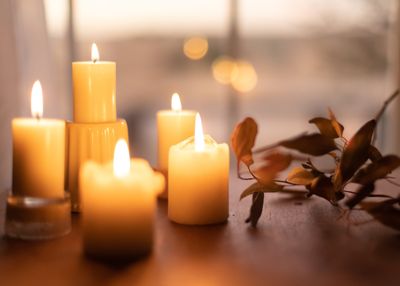Navigating Illness, Loss, & Grief

Loss is an inevitable part of life. Grieving those losses is a journey and a natural part of the healing process. We experience grief for many reasons, including the loss of a loved one, the loss of health, or letting go of a long-held dream. Dealing with a significant loss can be a challenging time in a person's life.
- The loss of a loved one
- The loss of health
- Letting go of a long-held dream
Please check out our short video on Understanding and Coping with Grief and Loss as well as a video specifically about Grief and Loss Related to COVID-19.
Different Kinds of Losses
Feelings of loss are personal and only you know what is significant to you. People commonly associate certain losses with strong feelings of grief. These can include:
- Death of a close relative
- Death of a friend
- Death of a partner
- Serious illness in a loved one
- The end of a relationship
- Loss of a close friendship
- Gender transition - Loss of a former identity/growth into a new identity
Less obvious losses can also cause strong feelings of grief, even though those around you might be less aware of your feelings. Some examples include:
- Loss of health through illness
- Death of a pet
- Moving to a new home or community
- Loss of a physical or mental ability
- Leaving home
- Leaving college
- Job change
- Loss of financial security
Sudden vs. Predictable Loss
Sudden losses—due to events like crimes, accidents, or suicide—can be traumatic. There is no way to prepare, and often no way to say goodbye. Such loss can especially challenge your sense of security and confidence in the predictability of life.
Predictable losses—like those due to terminal illness—can allow more time to adjust and prepare. However, they create two layers of grief: the grief related to the anticipation of the loss and the grief related to the final loss.
How Long Does Grief Last?
There is no predictable schedule for grief. It is a journey that looks different for everyone. Although grieving can be very painful at times, it cannot be rushed. It is important to be patient with yourself as you experience the feelings and your unique reactions to the loss. With time and support, things generally do get better.
However, it is normal for significant dates, holidays, or other reminders to trigger feelings related to the loss. Additionally, the experience of grief can evolve and transform over a lifetime. The loss may be felt and expressed differently over time, and it is important to honor your feelings at every stage. Taking care of yourself, seeking support, and acknowledging your feelings during these times are ways that can help you cope.
Common Grief Reactions
When experiencing grief, it is common to feel…
- Frustrated or misunderstood
- Irritable or angry (at the deceased, oneself, others, higher powers)
- Guilty
- Homesick
- Isolated–or, that you need more time alone
- Anxious, stressed, unable to concentrate
- Ambivalent
- Confused
- Numb, or without feelings
Grief as a Process of Healing
Several authors have described typical stages or needs that the grieving person experiences.
For example, Elizabeth Kubler-Ross suggested that grief involves stages of denial,
anger, bargaining, depression, and acceptance. Alan Wolfelt described "mourning needs,"
which include acknowledging the reality of the death, embracing the pain of the loss,
remembering the person who died, developing a new self-identity, searching for meaning,
and receiving ongoing support from others.
It is important to note that the grief process is not linear but is more often experienced in cycles. Grief is sometimes compared to climbing a spiral staircase where things can look and feel like you are just going in circles, yet you are actually making progress. Patience with the process and allowing feelings to come without judgment can help. If you feel stuck in your grief, talking to a counselor or a supportive person may help you move forward in the healing process.
Culture, Rituals, and Ceremonies
Your cultural background can affect how you understand and approach the grief process. Some cultures anticipate a "time to grieve" and have developed rituals to help people through the grieving process. Support from others can be a reminder that grief is a universal experience and that you are not alone. After a significant loss, some cultures have mourning rituals to mark the passage of time and help individuals reconnect with their lives.
A mourning ritual can occur during a meaningful time, like an anniversary, wake, or holiday, or at a distinct location, like a church, synagogue, or home. In some cultures, for example, there are the anniversary religious services, the reciting of Kaddish, and El Día de los Muertos. Grief rituals and ceremonies acknowledge the pain of loss while also offering social support and a reaffirmation of life.
You may not be conscious of how your own cultural background affects your grief process. Talking with family, friends, or religious leaders is one way to strengthen your awareness of possible cultural influences in your life. Friends and family may be able to help you generate ideas to create your own rituals. Some have found solace in creating their own rituals, such as a ceremony with friends, or writing a letter to the deceased.
Coping with Grief
- Talk to family or friends

- Seek counseling
- Join a support group
- Seek spiritual support
- Read poetry or books
- Write in a journal
- Eat nutritious foods
- Find ways to feel close to the person you lost (Look at pictures, write about memories, cook their favorite foods, etc.)
- Exercise
- Listen to music
- Let yourself feel grief
- Be patient with yourself
Each of us has an individual style of coping with painful times. The list above may help you generate ideas about how to manage your feelings of grief. You may want to experiment with these ideas or create a list of your own. Talking to friends who have dealt with loss in the past can help you find new ways of coping. Only you know what coping skills will fit best with your personality and lifestyle.
One way to examine your own style of coping is to recall the ways you've dealt with painful times in the past. It's important to note that some ways of coping with grief are helpful, like talking to others, writing in a journal, and so forth. Others may be hurtful or destructive to the healing process, like substance abuse or isolation. Healthy coping skills are important in resolving a loss. They cannot take away your feelings of grief, but they can help you move forward in the healing process.
Supporting Others who are Grieving
- Practice attentive listening

- Ask about their feelings
- Be present
- Share your feelings
- Ask about their loss—if it’s a loved one, ask them to tell you about that person
- Remember the loss—continue to check in
- Make telephone calls, or find other ways to help
- Acknowledge the pain
- Let them feel sad
- Avoid minimizing their experience with phrases like "They're in a better place" or "Everything happens for a reason"
- Do not assume religious identity or beliefs
Often, it can be difficult for a grieving person to verbalize exactly what they need in terms of support. Try sending food, checking in periodically, writing a letter, or asking about their loss unprompted.
People who are grieving often feel isolated or lonely in their grief. Soon after the loss, social activities and support from others may decrease. As the shock of the loss fades, there is a tendency on the part of the griever to feel more pain and sadness. Well-meaning friends may avoid discussing the subject due to their own discomfort with grief or their fear of making the person feel bad. They may not know what to say.
People who are grieving are likely to fluctuate between wanting some time to themselves and wanting closeness with others. They may want someone to talk to about their feelings. Showing concern and thoughtfulness about a friend shows that you care. It's better to feel nervous and awkward sitting with a grieving friend than to not sit there at all.
Campus Resources
Counseling Center
410-617-CARE, Humanities 150 (across from Starbucks, one flight up the turret; accessible
entrance through the courtyard)
Offers individual counseling and a weekly bereavement support group for students.
Counseling services are free and confidential. Stop by or call for information or
to schedule an appointment.
Campus Ministry
410-617-2768, Cohn Hall 12
Facilitates opportunities for worship, music, retreats, spiritual development, and
pastoral care.
Academic Services/Class Deans
410-617-5050
Provides academic support including connecting with professors and navigating academic
demands while struggling with a loss or illness.
Readings
“Sorrow felt alone leaves a deep crater in the soul; sorrow shared yields new life.”
- Ladysmith Black Mambazo, from the song “Nomethemba”
Readings on Grief and Loss
Books & Articles
- Carlile, Molly (2010). Sometimes Life Sucks: When Someone You Love Dies. Australia: Allen & Unwin.
- Colgrove, M., Bloomfield, H. & McWilliams, P. (1976). How to Survive the Loss of a Love. New York: Bantam.
- Kushner, Harold (1981). When Bad Things Happen to Good People. New York: Schocken.
- Noel, Brook & Blair, Pamela (2008). I Wasn't Ready to Say Goodbye. Naperville, IL: Sourcebooks.
- Rando, Therese (1991). How to go on Living when Someone You Love Dies. New York: Bantam.
- Sterns, Ann Kaiser (1984). Living through Personal Crisis. New York: Ballantine.
- Viorst, Judith (1986). Necessary Losses. New York: Fawcett Gold Medal.
- Wolfelt, Alan (1997). The Journey through Grief. Ft. Collins, CO: Companion Press.
- Wolfelt, Alan (2009). Understanding Your Suicide Grief. Fort Collins, CO: Companion Press.
- Warner, Jan (2018). Grief Day by Day: Simple Practices and Daily Guidance for Living with Loss.
- Cacciatore, Joanne (2017). Bearing the Unbearable.
Podcasts
COVID Loss
The COVID-19 pandemic has created a unique set of challenges for people who are grieving. Many were forced to delay formal services. Others were not able to be physically present with their loved ones as they passed. Connection and closeness, which is often so important during the grieving process, was made especially difficult. It is important to find ways to acknowledge these losses, express your grief, and find ways to seek support, as we continue to navigate the lasting impact of the pandemic.
Consider Togetherall, a 24/7 confidential peer to peer mental wellness resource, free to all enrolled
Loyola students. Register here today. Due to state licensing laws, students must be residing in Maryland to be eligible
for Let’s Talk, assessment, and therapy services. The Counseling Center located in Humanities 150 is open M-F from 8:30am until 5pm
(EST) and closed when the university is closed. If you would like to make an appointment
with a counselor, schedule an appointment online, stop by our office, or call 410-617-2273.
Contact Us
Humanities, Room 150One flight up the turret entrance
Phone: 410-617-CARE (2273)
Call to schedule an appointment
Monday - Friday, 8:30 a.m. - 5 p.m.